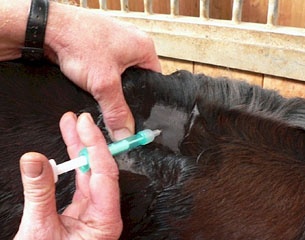
Finnish researcher Sonja Leskinen of the Institute for Advanced Management Systems Research in Turku, Finland, conducted an empirical study on veterinarians' attitudes towards Digital Technology. She wondered whether a horse's medical information should be databased
so no info gets lost when the horse sells.
In an abstract of her research Leskinen wrote:
At competitions horse identification and vaccination control takes much of the competition organizers time. FEI’s clean sport initiative relies today partly on a paper based medication logbook. In this paper, the purpose is to find out what the bottlenecks in a veterinarian’s daily routines are, how veterinarians use technology, and what their attitudes towards new technological innovations that could support their work are.
A horse’s medical information is not likely to remain with it throughout its life, since horses can be sold several times during their lifetime. With a functioning mobile- and internet-service and connecting it with an electronic database, we can ensure that a horse’s identity and medical information remain with it throughout its life, and thus we get transparency into the whole industry.
In this way, the identification and vaccinations of the horse can be easily checked at competitions and medical information checked by FEI testing veterinaries if necessary. We have carried out a survey and several interviews with riders, horse owners, competition organizers and veterinarians.
During the survey and the interviews it became clear that the vaccination protocols as they are today are very cumbersome to use, and there is a need for improvements. Therefore during fall 2010, a new survey was conducted with Finnish veterinarians, to get a more thorough picture of the situation from their point of view.
The veterinarians chosen for this survey were listed as either practicing equine medicine a/o official county veterinarians (N=511). The response rate was 31.5%. Veterinarians who listed themselves as treating horses and production animals, i.e. the veterinaries who most likely make house calls, definitely agreed (14.3%) or somewhat agreed (39%) that they could improve the way they keep records during house calls. Also over half of these veterinarians would use a mobile device if it improved their work performance. The majority of the veterinarians would use a national medical database for horses (70.8%). The equine medicine veterinarians agreed or somewhat agreed that they would be comfortable to share, in a database, diagnostic data (96.3%), medical data (98.8%), treatments (92.8%) and vaccination data (98.8%).
The various stakeholders are interested to use information systems and mobile technology as help tools, but it is important that these tools are easy to use and useful.
In this research the aim is to find out what the bottlenecks in a veterinarian’s work are and how some of these bottlenecks could be solved with technological innovations. A study with veterinarians showed that mobile and IS tools could be a solution.
-- ISES Conference abstract
Related Link
Eurodressage Veterinary News